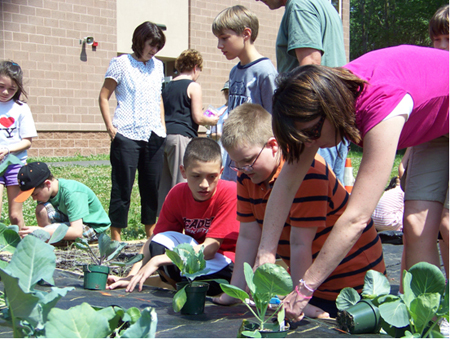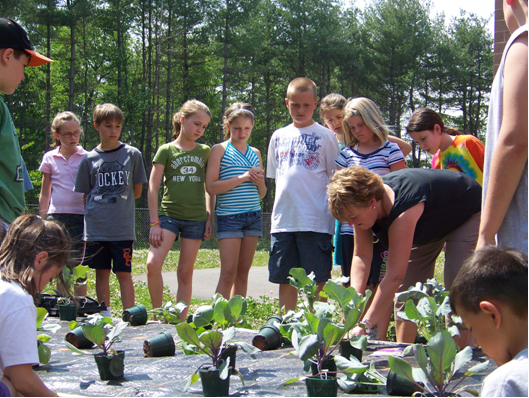The Eagle Garden Project
 ‘Vegetation Sensation’ Garden
‘Vegetation Sensation’ Garden
Gardens offer dynamic, beautiful settings in which to integrate every discipline, including science, math, reading, environmental studies, nutrition, and health. Such interdisciplinary approaches cultivate the talents and skills of all students while enriching their capacities of observation and thinking.
With this in mind, the Eagle Garden Project was established in the spring of 2010, with the hard work and assistance of students, school staff, families, and local businesses. The Eagle Garden is located behind the kindergarten wing of Eagle Elementary School. In June of 2010, Eagle Garden was officially renamed Vegetation Sensation, as voted on by the students.
The Vegetation Sensation Project will…
Serve as an outdoor classroom for students
Promote healthy eating habits and lifestyle choices
Provide fresh produce to the school lunch program and to community organizations
Model responsible ecological stewardship
Foster collaborative activities between classes and community groups
Sign up to adopt Vegetation Sensation for a week in the summer
Each summer we look for parents and families to adopt Vegetation Sensation for a week. To help maintain the garden when school is out, sign up for one week of garden care. Bring the family, do a little weeding and watering, and then donate or bring home the harvest. A sign-up link will be provided ahead of each summer’s program.
Volunteer Opportunities
The Vegetation Sensation Committee, consisting of parent volunteers and Eagle personnel, will maintain and support the school garden year-round. Contact the school’s main office for information on how to join this committee.
Gardening the Vegetation Sensation Way
No synthetic fertilizers, pesticides or herbicides will be utilized in the garden. The garden is a part of a whole system that starts with the soil and includes the water supply, people, wildlife, and insects. Our gardening methods will work in harmony with nature. Square foot gardening will be utilized in some of the raised beds. This is a technique of dividing the planting bed into small units. Square foot gardening allows a greater density of plants to grow than row gardening. This results in a greater harvest per square foot of garden, as well as fewer weeds, since the crops themselves fill the available space.
The garden is a part of a whole system that starts with the soil and includes the water supply, people, wildlife, and insects. Our gardening methods will work in harmony with nature. Square foot gardening will be utilized in some of the raised beds. This is a technique of dividing the planting bed into small units. Square foot gardening allows a greater density of plants to grow than row gardening. This results in a greater harvest per square foot of garden, as well as fewer weeds, since the crops themselves fill the available space.
Additionally, Integrated Pest Management will also be implemented. This method of insect control uses natural enemies of harmful insects, rather than pesticides, to control crop loss. Companion planting will also be utilized as a way to repel harmful insects and, sometimes, to attract beneficial ones, such as bees.
